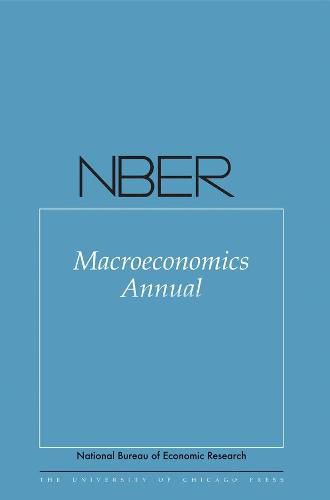Readings Newsletter
Become a Readings Member to make your shopping experience even easier.
Sign in or sign up for free!
You’re not far away from qualifying for FREE standard shipping within Australia
You’ve qualified for FREE standard shipping within Australia
The cart is loading…






Volume 32 of the NBER Macroeconomics Annual features six theoretical and empirical studies of important issues in contemporary macroeconomics, and a keynote address by former IMF chief economist Olivier Blanchard. In one study, SeHyoun Ahn, Greg Kaplan, Benjamin Moll, Thomas Winberry, and Christian Wolf examine the dynamics of consumption expenditures in non-representative-agent macroeconomic models. In another, John Cochrane asks which macro models most naturally explain the post-financial-crisis macroeconomic environment, which is characterized by the co-existence of low and nonvolatile inflation rates, near-zero short-term interest rates, and an explosion in monetary aggregates. Manuel Adelino, Antoinette Schoar, and Felipe Severino examine the causes of the lending boom that precipitated the recent U.S. financial crisis and Great Recession. Steven Durlauf and Ananth Seshadri investigate whether increases in income inequality cause lower levels of economic mobility and opportunity. Charles Manski explores the formation of expectations, considering the efficacy of directly measuring beliefs through surveys as an alternative to making the assumption of rational expectations. In the final research paper, Efraim Benmelech and Nittai Bergman analyze the sharp declines in debt issuance and the evaporation of market liquidity that coincide with most financial crises. Blanchard’s keynote address discusses which distortions are central to understanding short-run macroeconomic fluctuations.
$9.00 standard shipping within Australia
FREE standard shipping within Australia for orders over $100.00
Express & International shipping calculated at checkout
Volume 32 of the NBER Macroeconomics Annual features six theoretical and empirical studies of important issues in contemporary macroeconomics, and a keynote address by former IMF chief economist Olivier Blanchard. In one study, SeHyoun Ahn, Greg Kaplan, Benjamin Moll, Thomas Winberry, and Christian Wolf examine the dynamics of consumption expenditures in non-representative-agent macroeconomic models. In another, John Cochrane asks which macro models most naturally explain the post-financial-crisis macroeconomic environment, which is characterized by the co-existence of low and nonvolatile inflation rates, near-zero short-term interest rates, and an explosion in monetary aggregates. Manuel Adelino, Antoinette Schoar, and Felipe Severino examine the causes of the lending boom that precipitated the recent U.S. financial crisis and Great Recession. Steven Durlauf and Ananth Seshadri investigate whether increases in income inequality cause lower levels of economic mobility and opportunity. Charles Manski explores the formation of expectations, considering the efficacy of directly measuring beliefs through surveys as an alternative to making the assumption of rational expectations. In the final research paper, Efraim Benmelech and Nittai Bergman analyze the sharp declines in debt issuance and the evaporation of market liquidity that coincide with most financial crises. Blanchard’s keynote address discusses which distortions are central to understanding short-run macroeconomic fluctuations.